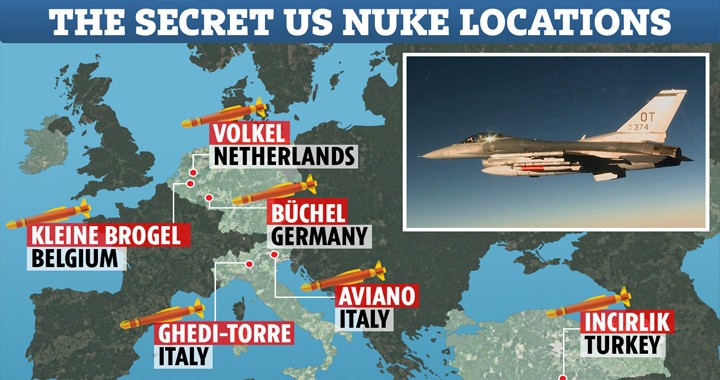
One Step to End the Russia/Ukraine War: Denuclearize All of Europe
Oscar Arias and Jonathan Granoff / Opinion @ The Hill
(July 19, 2022) — It is time for bolder efforts to make peace in Ukraine.
War, like fire, can spread out of control, and as President Putin keeps reminding us, this particular conflagration has the potential to start a nuclear war.
At a recent joint news conference with the President of Belarus, Putin announced that Russia would transfer Iskander M missiles to Belarus. Those missiles can carry nuclear warheads, and the move is apparently intended to mirror nuclear sharing arrangements the United States has with five NATO allies — Belgium, the Netherlands, Germany, Italy, and Turkey.
US nuclear weapons were introduced into Europe in the 1950s as a stopgap measure to defend NATO democracies whose conventional forces were weak. The number of nuclear weapons in those five countries peaked around 7,300 warheads in the 1960s, then dwindled to about 150 today, reflecting NATO’s growing conventional strength and its diminishing estimation of the military usefulness of nuclear weapons. But even 150 nuclear weapons could be more than sufficient to touch off a dangerous confrontation with Russia.
The world is as close to the nuclear abyss today as it was during the Cuban Missile Crisis. In fact, contemporary nuclear risks may actually be worse. Whereas Cuban Missile Crisis lasted just 13 days, the fighting in Ukraine will likely continue and tempt fate for many months to come.
Negotiations are therefore essential to defuse nuclear tensions. Even though it has no direct role in the Ukraine war, it’s appropriate for NATO to have a role in encouraging negotiations to end it.
Since NATO is an enormously strong military force — stronger even than Putin’s Russia — and since President Putin has said that the war in Ukraine is in part a response to NATO’s actions, NATO calling for peace negotiations would be fitting and carry some weight.

It would also be in keeping with NATO member states’ obligations under the Nuclear Non-Proliferation Treaty. NATO leaders meeting in Madrid recently reaffirmed that “The Nuclear Non-Proliferation Treaty is the essential bulwark against the spread of nuclear weapons and we remain strongly committed to its full implementation, including Article VI [the article that commits nuclear-armed states to pursuing nuclear disarmament].”
This commitment includes, according to the Non-Proliferation Treaty’s 2000 Review Conference report, “a diminishing role for nuclear weapons in security policies to minimize the risk that these weapons ever be used and to facilitate the process of their total elimination.”
NATO traditionally maintains strong deterrence and defense, while it has also led the way toward detente and dialogue. NATO’s current commitment to deterrence and defense is clear. But to restart conversations, NATO must now also find a way to encourage détente and dialogue.
Bringing both sides back into dialogue will require a dramatic gesture. Therefore, we propose NATO plan and prepare for withdrawal of all US nuclear warheads from Europe and Turkey, preliminary to negotiations. Withdrawal would be carried out once peace terms are agreed between Ukraine and Russia. Such a proposal would get Putin’s attention and might bring him to the negotiating table.
Removing US nuclear weapons from Europe and Turkey would not weaken NATO militarily, since nuclear weapons have little or no actual usefulness on the battlefield. If they are truly weapons of last resort, there is no need to deploy them so close to Russia’s border. Under this proposal, France, the United Kingdom, and the United States would retain their national nuclear arsenals, and if the worst happened, they could still use them on NATO’s behalf.
Despite 70 years without a major war, it is not possible for nuclear deterrence to last forever. It only works as long as human beings make the right choices. Yet we know humans are flawed, and we all make mistakes.
Therefore we concur with UN Secretary General Guterres, who said, “These weapons offer false promises of security and deterrence — while guaranteeing only destruction, death, and endless brinksmanship,” and with Pope Francis, who said, “[Nuclear weapons] exist in the service of a mentality of fear that affects not only the parties in conflict, but the entire human race.,” as well as with the late US Senator Alan Cranston who simply said, “Nuclear weapons are unworthy of civilization.”

NATO ignores Russia’s plea to remove atomic weapons from Europe
NATO’s nuclear arsenal failed to deter Russia’s invasion of Ukraine and has almost no utility as a weapon of war. But NATO’s nuclear weapons can still be put to good use, not by threatening to launch them and escalate the war, but by withdrawing them to make room for new negotiations and eventual peace.
Nobel Peace Laureate Oscar Arias was the President of Costa Rica from 1986 to 1990 and 2006 to 2010. Jonathan Granoff is President of the Global Security Institute, and a Nobel Peace Prize nominee.
The views expressed b contributors are their own and not the view of The Hill.
Posted in accordance with Title 17, Section 107, US Code, for noncommercial, educational purposes.